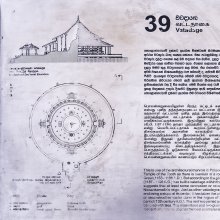Uga, Ugā: 4 definitions
Introduction:
Uga means something in Marathi, Jainism, Prakrit, biology. If you want to know the exact meaning, history, etymology or English translation of this term then check out the descriptions on this page. Add your comment or reference to a book if you want to contribute to this summary article.
Images (photo gallery)
Biology (plants and animals)
Source: Google Books: CRC World Dictionary (Regional names)Uga in India is the name of a plant defined with Salvadora persica in various botanical sources. This page contains potential references in Ayurveda, modern medicine, and other folk traditions or local practices It has the synonym Salvadora crassinervia Hochst. ex T. Anderson (among others).
Example references for further research on medicinal uses or toxicity (see latin names for full list):
· Nat. Prod. Res. (2003)
· Species Plantarum (1753)
· J. Proc. Linn. Soc., Bot. (1860)
· Nomenclator Botanicus (1840)
· Cytologia (1988)
If you are looking for specific details regarding Uga, for example side effects, chemical composition, health benefits, pregnancy safety, extract dosage, diet and recipes, have a look at these references.

This sections includes definitions from the five kingdoms of living things: Animals, Plants, Fungi, Protists and Monera. It will include both the official binomial nomenclature (scientific names usually in Latin) as well as regional spellings and variants.
Languages of India and abroad
Marathi-English dictionary
Source: DDSA: The Molesworth Marathi and English Dictionaryugā (उगा).—ad decl sometimes ugī ad Without speaking, moving, working, doing; without a profession or business; without a purpose or motive;--i. e. silently; still; at rest or ease; idly, merely, unthinkingly: also without cause, occasion, grounds, reason, necessity, profit &c. Laxly applied. Ex. ugā aisa bōlasīla tara; ugā baisa agadī hālūṃ nakō; tujhēṃ śarīra agadī śramānēṃ aḷalēṃ tū mahinābhara ugā baisa; tyā divasāpāsūna mī ugā āpalē gharīṃ paḍalōṃ; mī ugā ālōṃ malā bōlāvayācēṃ kāṃhīṃ nāhīṃ; hī pṛthvī tō sūrya tīṃ nakṣatrēṃ hīṃ ugīṃ jhālīṃ kāya? hā pāūsa ugā paḍatō; myāṃ dōna varṣē ugā vyāpāra kēlā. The learner should trace out in these examples the exemplification of the senses given above. ugā or ugāñca, ugīñca &c. is in every body's mouth, and possibly with yet obscurer applications.
Source: DDSA: The Aryabhusan school dictionary, Marathi-Englishugā (उगा) [-gī, -गी].—ad Without speaking, moving, doing; silent, at rest or ease.
Marathi is an Indo-European language having over 70 million native speakers people in (predominantly) Maharashtra India. Marathi, like many other Indo-Aryan languages, evolved from early forms of Prakrit, which itself is a subset of Sanskrit, one of the most ancient languages of the world.
Prakrit-English dictionary
Source: DDSA: Paia-sadda-mahannavo; a comprehensive Prakrit Hindi dictionaryUga (उग) in the Prakrit language is related to the Sanskrit word: Udgam.
Prakrit is an ancient language closely associated with both Pali and Sanskrit. Jain literature is often composed in this language or sub-dialects, such as the Agamas and their commentaries which are written in Ardhamagadhi and Maharashtri Prakrit. The earliest extant texts can be dated to as early as the 4th century BCE although core portions might be older.
See also (Relevant definitions)
Starts with (+55): Ugaal, Ugabhoga, Ugada, Ugadi, Ugadu, Ugagake, Ugagane, Ugahana, Ugahi, Ugakkay, Ugala, Ugalana, Ugalanem, Ugaldan, Ugali, Ugalna, Ugalnu, Ugalu, Ugama, Ugamisu.
Ends with (+772): Abhavuga, Abhilasuga, Abhimanageduga, Accuga, Acculuga, Acuga, Adagucuccuga, Adavau-muga, Adavi booruga, Adavi buruga, Addhoruga, Adduga, Adhiprashtiyuga, Adijivayuga, Adiyuga, Adjouga, Adjuga, Aduruga, Agamtuga, Agatambambuga.
Full-text (+8): Uganca, Ugamuga, Progastotra, Progaciti, Progacit, Uvattekku, Uginca, Progashastra, Praugadhyaya, Kalarva, Candakirana, Uvay, Udgam, Ukay, Ukavai, Progya, Ukappu, Udga, Omai, Proga.
Relevant text
Search found 3 books and stories containing Uga, Ugā; (plurals include: Ugas, Ugās). You can also click to the full overview containing English textual excerpts. Below are direct links for the most relevant articles:
Rig Veda (translation and commentary) (by H. H. Wilson)
Rig Veda 10.130.3 < [Sukta 130]
Impact of Vedic Culture on Society (by Kaushik Acharya)
Folk Tales of Gujarat (and Jhaverchand Meghani) (by Vandana P. Soni)
Chapter 35 - Vikram and Khapro < [Part 5 - Rang Chee Barot]

